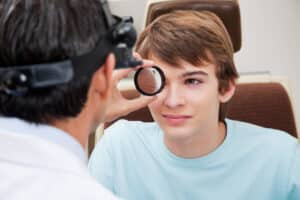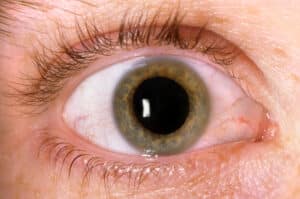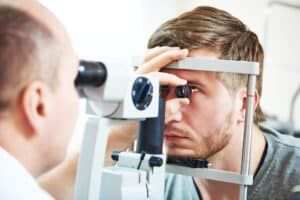Dilation of the pupils is a normal response our body has that filters out light to enable us to see. Many know what this feels like if they have been to an optometrist needing glasses. Although dilated eyes are normal and instigated by doctors, people can struggle with dilated pupils. Understanding why our pupils dilate or not is important to our vision health. Read on to learn more about dilated pupils and the treatment options available at Cleveland Eye Clinic.
Table of Contents
What Are Dilated Pupils?

Dilated pupils happen when the pupil of the eye becomes bigger than usual. The pupil is the black in the middle of your eye, and the color around it is called the iris. Naturally, your pupils will get bigger or smaller in size based on the light around you. The size of the pupils is controlled by tiny muscles in the iris. In bright light, your pupils get smaller, and in dim light, they get bigger. To have dilated pupils as a condition means that your pupils won’t react to bright light and decrease in size.
When you have dilated eyes, it affects your quality of vision along with other health effects like migraines and even leads to strokes.
Natural Response to Light
The table below shows the range as to what size pupils normally are based on the light they’re in.
| Natural Response to Light | Bright Light | Dim Light |
| Normal Pupil Size | 2-4mm | 4-8mm |
| Dilated Pupil Size | 4-8mm | 4-8mm |
The size of a person’s pupils can vary but would be considered normal if the pupil size in bright light is about 2-4mm big. When you have dilated pupils, they will stay enlarged even in bright light.
What Causes Dilated Pupils?
Medications and Drug Use
Sometimes, your pupils will dilate based on certain medications and drugs. Using these substances can cause our eyes to dilate even in bright light and affect our body’s natural response to light. Many of these are common household drugs such as:
- Benadryl and other antihistamines
- Sudafed and other decongestants
- Lioresal and other muscle relaxants
- Norpramin and other antidepressants
- Symmetrel and other Parkinson’s medications
If you believe you are experiencing dilated eyes from the medication you are on, talk to your doctor or call one of our eye care specialists to potentially explore other options.
Eye Injuries
In rare cases, an eye or head injury can damage the nerves in your eye that control the pupil’s size. Injuries such as a contusion to the head or surgeries like cataract removal and cornea transplant can lead to dilated pupils.
Medical Conditions
Some medical conditions cause dilated eyes, such as:
- Adie’s Pupil which is when one of your eyes reacts differently to light.
- Anisocoria is when the pupils are different sizes from each other.
- Microvascular cranial nerve palsy, which blocks blood flow to nerves.
- Ocular migraine is where one eye can experience a sudden array of changes, similar to migraine sufferers without a headache.
Emotions and Focus
It has been a trend on social media to go up to your partner and see if their pupils dilate when they see you because if they do, that means they’re in love with you. Although that may not be necessarily true in every case, your emotions do have a play on your pupils dilating.
When To Worry About Dilated Pupils
It is normal for pupils to dilate and should not cause worry if you notice the black circle in your eye getting bigger or smaller, especially when you change the lighting in the room. If you notice your pupils are dilated and are not getting smaller, we recommend seeking medical attention immediately. You should also contact your healthcare provider if you notice you have the following:
- Dizziness, headache, or confusion.
- Sudden pupil dilation that isn’t caused by light change.
- Pupils don’t change in size when light changes.
- One pupil is larger than the other.
- Dilation persists for long periods.
How to Check Your Pupil Size
You can check your pupil size at home by going up to a mirror, then dimming and raising the lights in the room to see how your pupils react.
Treatments for Dilated Pupils
The treatment options for dilated eyes will depend on the specific person and will require an eye exam to diagnose. Your doctor may recommend using sunglasses that have polarized lenses or custom prosthetic contact lenses.
Call Cleveland Eye Clinic for Treatment for Dilated Pupils
If you are concerned about having dilated eyes, call one of our eye experts at Cleveland Eye Clinic to book a comprehensive eye exam. We offer premier treatments and procedures, like a corneal transplant, to give you the best vision possible. Our reliable team is committed to ensuring that you get the very best treatment and results.
Your eye health is essential to your overall health. Reach out to us today.
Frequently Asked Questions:
What is Mydriasis?
Mydriasis is another term for dilated pupils not responding to light. Mydriasis, dilated pupils or eyes, and “fixed pupil” are all interchangeable terms to describe a pupil’s inability to change in size.
What do dilated pupils look like?
When a person has dilated pupils, the black in the center of their eyes is very big, making it difficult to see what color eyes the person has.
Can one pupil be more dilated than the other?
Yes, one pupil can be more dilated than the other, which is a condition called anisocoria, which is a lot more common, affecting 20% of the population.
Do dilated pupils hurt?
Dilated pupils may be very uncomfortable, and depending on the person’s light sensitivity, they could have blurry vision and headaches.
When do dilated pupils return to normal after medication use?
Your pupils should return to normal depending on the type of medication and dosage received. If you received dilating eye drops from your eye doctor, your pupils should return to normal in 24 hours.
How are dilated pupils treated?
Dilated pupils can be treated with:
- Wearing sunglasses
- Prosthetic contact lenses
- Surgery
- Substance abuse rehabilitation










